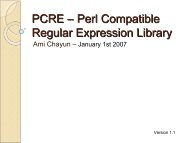Building a kernel module for many distribuitions
Building a kernel module for many distribuitions
Building a kernel module for many distribuitions
You also want an ePaper? Increase the reach of your titles
YUMPU automatically turns print PDFs into web optimized ePapers that Google loves.
<strong>Building</strong> a <strong>kernel</strong> <strong>module</strong> <strong>for</strong> <strong>many</strong><strong>distribuitions</strong>Rami Rosenramirose@gmail.comHaifux – Lightning Talks , July 2008
<strong>Building</strong> a <strong>kernel</strong> <strong>module</strong> <strong>for</strong> <strong>many</strong><strong>distribuitions</strong>We want to build a <strong>kernel</strong> <strong>module</strong> <strong>for</strong>FC4,FC5,FC6,FC7,FC8,FC9 and EL4,EL5 andmaybe more <strong>distribuitions</strong>.If we will try to insmod a <strong>module</strong> built on FC4to ,say, FC9, we will get an error:insmod: error inserting 'myModule.ko': -1 Invalid<strong>module</strong> <strong>for</strong>matIn syslog , you will see:version magic xxx should be yyy.xxx = <strong>module</strong> vermagic; yyy = <strong>kernel</strong> vermagic
<strong>Building</strong> a <strong>kernel</strong> <strong>module</strong> <strong>for</strong> <strong>many</strong><strong>distribuitions</strong>●modprobe -f or modprobe --<strong>for</strong>ce will not helpin this case.
<strong>Building</strong> a <strong>kernel</strong> <strong>module</strong> <strong>for</strong> <strong>many</strong><strong>distribuitions</strong>-contd●●Behind the scenes:– insmod/modprobe call a system call,sys_init_<strong>module</strong>() (<strong>kernel</strong>/<strong>module</strong>.c.)– -f (--<strong>for</strong>ce) options is the same as --<strong>for</strong>ce-vermagicand –<strong>for</strong>ce-modversion together; see manmodprobe.See also: include/linux/vermagic.h and:– include/linux/version.h– For 2.6.25 it has:– #define LINUX_VERSION_CODE 132633– 132633 is 20619 => a hex representation of 2.6.25
<strong>Building</strong> a <strong>kernel</strong> <strong>module</strong> <strong>for</strong> <strong>many</strong><strong>distribuitions</strong>-contd●You can see the vermagic of a <strong>module</strong> by:●modinfo -F vermagic myModule.ko– (-F stands <strong>for</strong> field)– 2.6.23.1-42.fc8 SMP mod_unload– (BTW: mod_unload says that the <strong>kernel</strong> was buildwith CONFIG_MODULE_UNLOAD set. Most distrosenable <strong>module</strong> unloading; when this is not the case,running “rmmod myModule” will cause this:– FATAL: Kernel does not have unload support.● Another way is by :●objdump myModule.ko --full-contents --section=.modinfo
<strong>Building</strong> a <strong>kernel</strong> <strong>module</strong> <strong>for</strong> <strong>many</strong><strong>distribuitions</strong>-contd●You can also use readelf --sections
<strong>Building</strong> a <strong>kernel</strong> <strong>module</strong> <strong>for</strong> <strong>many</strong><strong>distribuitions</strong>-contd●●●Note:If the <strong>kernel</strong> version is 2.6.x.y.z, then <strong>module</strong>sbuilt against 2.6.x.y will load into 2.6.x.y.*<strong>kernel</strong>s.For example:– A <strong>module</strong> built against 2.6.25.9-76.fc9.x86_64(latest FC9 <strong>kernel</strong>-devel) will load into 2.6.25 <strong>kernel</strong>
●●<strong>Building</strong> a <strong>kernel</strong> <strong>module</strong> <strong>for</strong> <strong>many</strong><strong>distribuitions</strong>-contdNot always we have machines available onwhich we have all these environments.Even if we have, and we build on each of themthe <strong>module</strong>, we have the overhead ofsynchronization between them.
<strong>Building</strong> a <strong>kernel</strong> <strong>module</strong> <strong>for</strong> <strong>many</strong><strong>distribuitions</strong>-contd●●●●●●●●There are several solutions.For example, virtualization, chroot.Proposed solution:First, install the <strong>kernel</strong>-devel rpm of each distro.– This rpm include (mostly) <strong>kernel</strong> header files.Find out which gcc is <strong>for</strong> each distro and installthe corresponding source rpm.For example:For FC6 we have gcc-4.1.1-30:Run: rpm -ivh gcc-4.1.1-30.src.rpm.
●●●●●<strong>Building</strong> a <strong>kernel</strong> <strong>module</strong> <strong>for</strong> <strong>many</strong><strong>distribuitions</strong>-contdCaveat: if you are building the <strong>module</strong> <strong>for</strong> fewerdistros (two, three...) than sometimes you mayhave a suitable compat-gcc pacakge ready.Then: rpm -bp/usr/src/redhat/SPECS/gcc41.specThe gcc source code is somewhere under /usr/src/redhat/BUILD/Then, you should build gcc.It is important to create a folder <strong>for</strong> the build.mkdir build; cd build
●●<strong>Building</strong> a <strong>kernel</strong> <strong>module</strong> <strong>for</strong> <strong>many</strong><strong>distribuitions</strong>-contd../configure --prefix=/work/tools/fc6/gcc--enable-threads=posix –enable-languages=cThen make and make install.● What is inaccurate here ?– We better use the configuration options with whichthe gcc from the selected distro was built. We can– Get these configuration options in the spec file ofthe gcc– To be on the safe side, it is also better to build thegcc against the corresponding binutils package.
<strong>Building</strong> a <strong>kernel</strong> <strong>module</strong> <strong>for</strong> <strong>many</strong><strong>distribuitions</strong>-contd●●Create a folder (let's say myFolder) which willhave your <strong>module</strong> source code and headerfiles. Let's say they are myModule.c andmyModule.h.Create subfolders, on <strong>for</strong> each distro:– myFolder/fc4,myFolder/fc5, etc.
<strong>Building</strong> a <strong>kernel</strong> <strong>module</strong> <strong>for</strong> <strong>many</strong><strong>distribuitions</strong>-contd●●●Create soft links <strong>for</strong> myModule.c,myModule.h in each subfolder.Then, create <strong>for</strong> each distro a Makefile in its correspondingfolder.Example <strong>for</strong> a Makefile <strong>for</strong> FC6:obj-m:= myModule.oCC:= /work/tools/fc6/gcc/bin/gccKDIR:=/usr/src/<strong>kernel</strong>s/2.6.18-1.2798.fc6-x86_64PWD:= $(shell pwd)default:$(MAKE) CC=$(CC) -C $(KDIR) SUBDIRS=$(PWD) <strong>module</strong>s
<strong>Building</strong> a <strong>kernel</strong> <strong>module</strong> <strong>for</strong> <strong>many</strong><strong>distribuitions</strong>-contd●In case you need to add #ifdef in the code <strong>for</strong>different <strong>kernel</strong>, there are two ways to do it:– EXTRA_CFLAGS in the makefile●For example:●EXTRA_CFLAGS := -DKER2625●And than , in the code, #ifdef KER2625– Adding using LINUX_VERSION_CODE/KERNEL_VERSION from include/linux/version.h– #if LINUX_VERSION_CODE >= KERNEL_VERSION(2,2,0)– ....– #endif
●<strong>Building</strong> a <strong>kernel</strong> <strong>module</strong> <strong>for</strong> <strong>many</strong><strong>distribuitions</strong>-contdIn myFolder, create a makefile which will callmake on all subfolders:●For example:#Makefileall:cd fc4 && $(MAKE)cd fc5 && $(MAKE)cd fc6 && $(MAKE)....cd el5 && $(MAKE)
<strong>Building</strong> a <strong>kernel</strong> <strong>module</strong> <strong>for</strong> <strong>many</strong><strong>distribuitions</strong>-contd● Thank you!
















